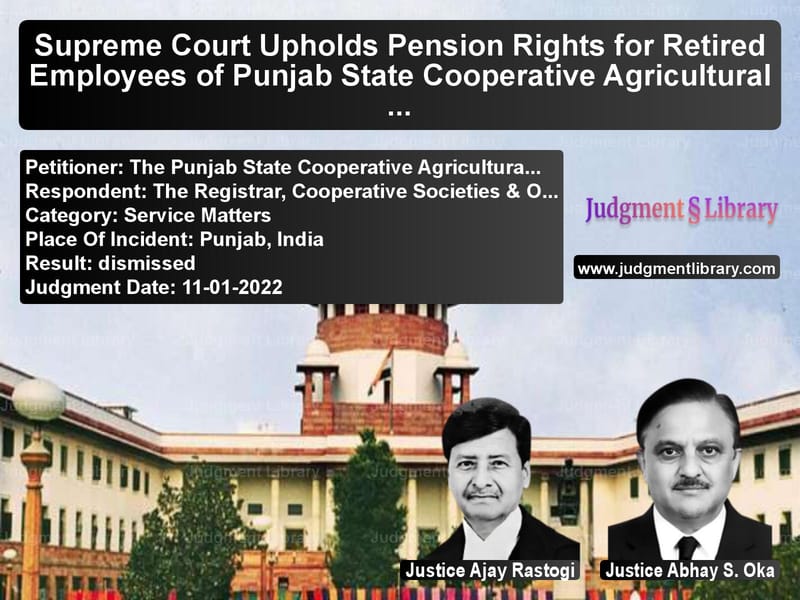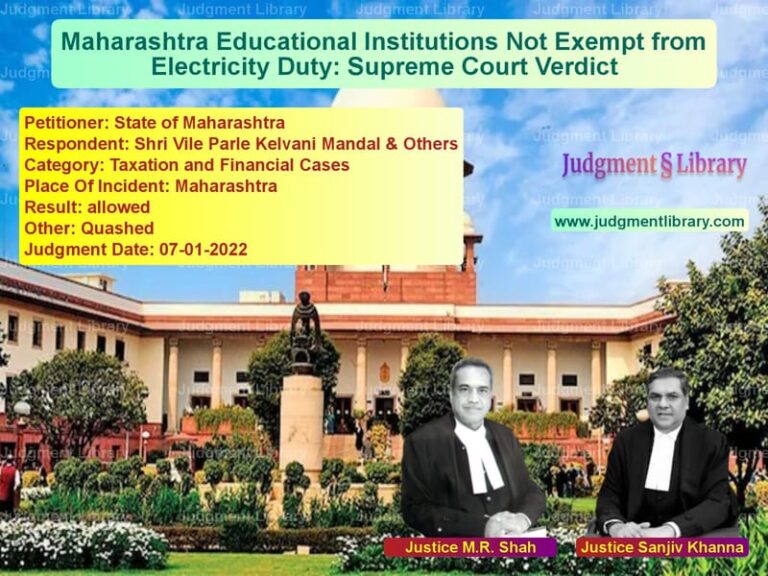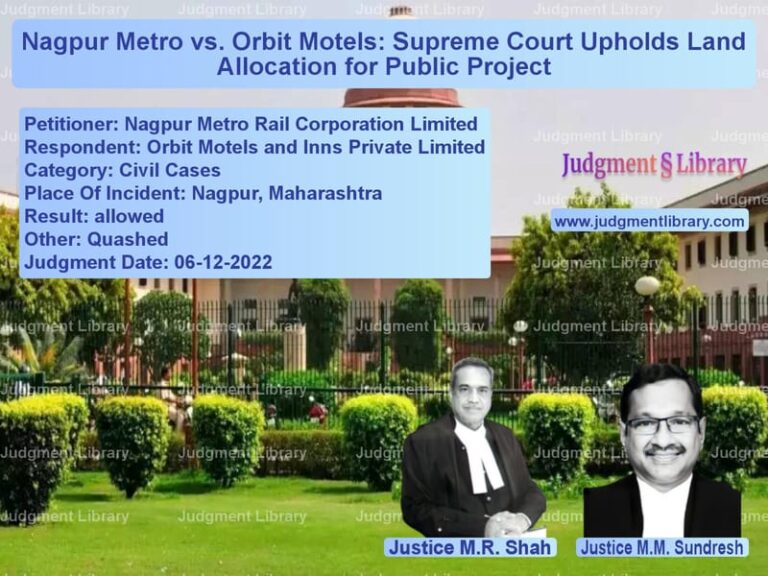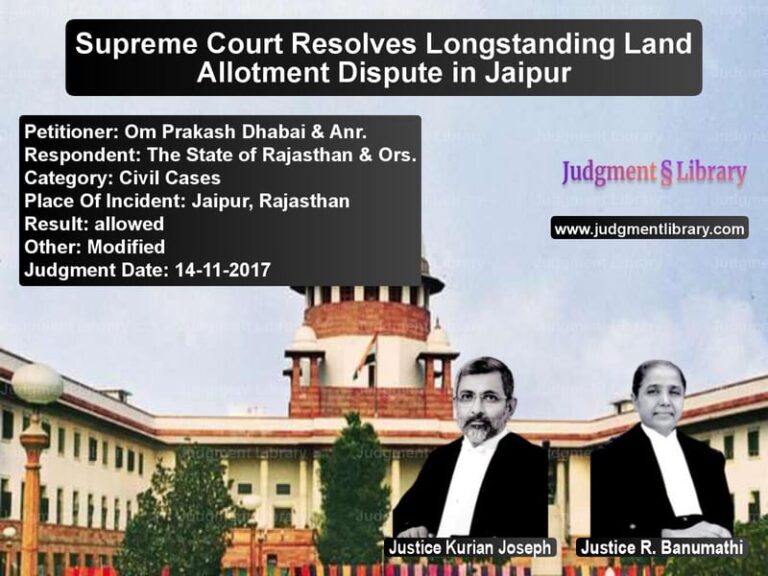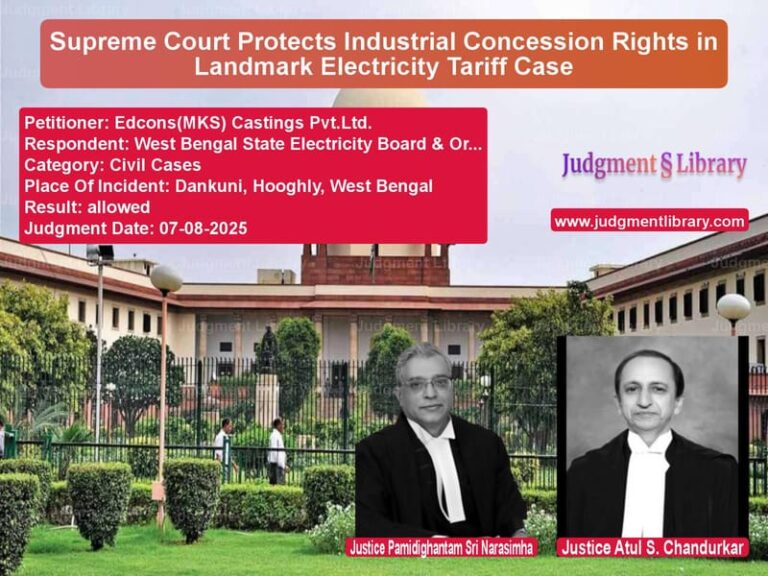Supreme Court Upholds Pension Rights for Retired Employees of Punjab State Cooperative Agricultural Development Bank
The case of The Punjab State Cooperative Agricultural Development Bank Ltd. v. The Registrar, Cooperative Societies & Others revolved around the discontinuation of a pension scheme for retired employees of the Punjab State Cooperative Agricultural Development Bank Ltd. (the Bank). The Supreme Court was tasked with determining whether the retrospective withdrawal of pension benefits violated the vested rights of retired employees.
Background of the Case
The Bank, a registered cooperative society, introduced a pension scheme on April 1, 1989, in line with recommendations from the Punjab Pay Commission. The scheme replaced the provident fund benefits under the Employees’ Provident Fund and Miscellaneous Provisions Act, 1952. Employees who opted for the pension scheme were assured of post-retirement financial security.
However, due to financial difficulties, the Bank’s Board of Directors passed a resolution on May 29, 2010, proposing modifications to the pension scheme. These included:
- Stopping commutation of pension.
- Discontinuing medical reimbursement and LTC benefits.
- Deducting 25% from pension payments.
- Suspending pension benefits for employees hired after January 1, 2004.
On March 11, 2014, the Bank formally deleted Rule 15(ii) from its service rules, effectively terminating the pension scheme. The retired employees challenged this decision in the Punjab and Haryana High Court, which ruled in their favor. The Bank then appealed to the Supreme Court.
Arguments of the Appellant (The Punjab State Cooperative Agricultural Development Bank Ltd.)
- The Bank argued that the pension scheme was financially unsustainable and its withdrawal was necessary to prevent bankruptcy.
- It contended that the employees were still entitled to pensions under the Employees’ Pension Scheme, 1995, and could not demand benefits from both schemes.
- The Bank claimed that continuing the pension scheme would lead to inequality between serving and retired employees.
Arguments of the Respondents (Retired Employees)
- The employees argued that pension benefits were vested rights that could not be arbitrarily withdrawn.
- They contended that the Bank’s financial difficulties did not justify depriving them of pensions.
- The withdrawal of pension benefits violated Articles 14 and 21 of the Constitution, as it took away social security from retired employees who had contributed to the scheme.
Key Observations of the Supreme Court
1. Vested Rights of Employees
The Court reaffirmed that pension benefits, once granted, become vested rights. It observed:
“An amendment that has the effect of taking away the benefits already available to an employee under the existing rule is arbitrary and violates Articles 14 and 21 of the Constitution.”
2. Retroactive Withdrawal is Unconstitutional
The Court ruled that the retrospective cancellation of the pension scheme was unlawful:
“A rule cannot operate retrospectively to divest an employee of a benefit that has already accrued. Such an amendment is unconstitutional.”
3. Financial Difficulties Do Not Justify Pension Withdrawal
The Court dismissed the Bank’s argument that financial distress justified discontinuing pensions:
“The inability to generate financial resources does not permit an employer to withdraw vested pension benefits from retired employees.”
4. Employees’ Pension Scheme, 1995, Does Not Replace Bank’s Pension Scheme
The Court ruled that the Employees’ Pension Scheme, 1995, could not replace the Bank’s pension scheme:
“The introduction of the Employees’ Pension Scheme, 1995, does not override or substitute the pension scheme voluntarily introduced by the Bank in 1989.”
5. One-Time Settlement Does Not Bar Pension Claims
Some employees had accepted a one-time settlement offered by the Bank. However, the Court ruled that this did not prevent them from claiming their rightful pension:
“The acceptance of a one-time settlement does not waive the legal rights of employees to pension benefits.”
Final Judgment
The Supreme Court dismissed the appeal, upholding the High Court’s judgment that the withdrawal of the pension scheme was unconstitutional. The key takeaways are:
- The Bank’s action to discontinue pensions was unlawful and violated the vested rights of retired employees.
- Employees must be paid pension benefits from the date they were stopped.
- The Bank must pay all arrears in 12 monthly installments by December 2022.
- Going forward, all eligible retired employees must receive their pensions without deductions.
This judgment reinforces the principle that pension benefits, once granted, cannot be arbitrarily withdrawn and that financial difficulties do not justify depriving retired employees of their livelihood.
Petitioner Name: The Punjab State Cooperative Agricultural Development Bank Ltd..Respondent Name: The Registrar, Cooperative Societies & Others.Judgment By: Justice Ajay Rastogi, Justice Abhay S. Oka.Place Of Incident: Punjab, India.Judgment Date: 11-01-2022.
Don’t miss out on the full details! Download the complete judgment in PDF format below and gain valuable insights instantly!
Download Judgment: the-punjab-state-coo-vs-the-registrar,-coope-supreme-court-of-india-judgment-dated-11-01-2022.pdf
Directly Download Judgment: Directly download this Judgment
See all petitions in Pension and Gratuity
See all petitions in Public Sector Employees
See all petitions in Employment Disputes
See all petitions in Judgment by Ajay Rastogi
See all petitions in Judgment by Abhay S. Oka
See all petitions in dismissed
See all petitions in supreme court of India judgments January 2022
See all petitions in 2022 judgments
See all posts in Service Matters Category
See all allowed petitions in Service Matters Category
See all Dismissed petitions in Service Matters Category
See all partially allowed petitions in Service Matters Category

